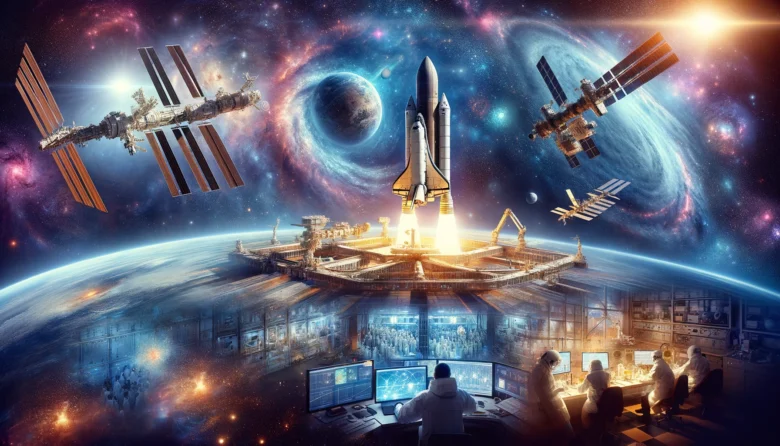Space exploration has long captivated humanity’s imagination, evolving from the early days of rocket science to the current era where private companies and international collaborations push the boundaries of what’s possible. It’s an odyssey not just of distance and technology but also of economics. This blog delves into the multifaceted investment landscape of space exploration, highlighting the interplay between government funding, private sector dynamism, and the spirit of international cooperation that fuels our quest for the stars.
Investment in Space Exploration
Government Funding: The Backbone of Space Innovation
Historically, the journey to outer space has been spearheaded by government agencies. Organizations like NASA (National Aeronautics and Space Administration), Roscosmos (Russian Federal Space Agency), ESA (European Space Agency), CNSA (China National Space Administration), and ISRO (Indian Space Research Organisation) have been instrumental, backed by significant government budgets. This funding has catalyzed a plethora of activities, from satellite launches to the construction of the ISS (International Space Station), underscoring the strategic value and scientific curiosity that drive nations to invest in the cosmos.

Private Sector Investment: The New Frontier
The last two decades have witnessed a seismic shift, with private enterprises such as SpaceX, Blue Origin, and Virgin Galactic taking center stage. Their mission? To democratize space access through groundbreaking innovations like reusable rockets. The infusion of private capital has not only intensified competition but also spurred technological advancements, making space more accessible and possibly more economical.
Public-Private Partnerships (PPPs): Collaborating for the Stars
PPPs represent a symbiotic model where governmental vision meets private innovation. Initiatives like NASA’s Commercial Crew Program exemplify this partnership, harnessing private ingenuity to further national and international space objectives. These alliances are proving essential in balancing the financial and technological scales of space exploration.
International Collaboration: A United Quest
The realm of space knows no borders. Projects like the ISS embody the spirit of global cooperation, pooling resources and expertise from across the world to achieve common goals. Such collaborations not only spread the financial burden but also enrich the scientific and cultural exchange, making space exploration a truly international endeavor.
Technological Innovation: Pushing the Boundaries
The quest for space is as much about overcoming terrestrial challenges as it is about exploring the unknown. Technological innovation, driven by the harsh demands of space, has led to breakthroughs that ripple through society. From the miniaturization of satellites to advancements in materials science, the technologies born from space exploration have applications that reach far beyond their cosmic origins, enhancing our daily lives and driving economic growth.

Conclusion
The economics of space exploration is a testament to humanity’s relentless pursuit of knowledge and progress. Through the combined efforts of governments, private entities, and international partnerships, we are not only reaching new heights but also fostering economic and technological advancements that have the potential to benefit all of humanity. As we continue to invest in and innovate for space exploration, we lay the foundation for a future that promises even greater discoveries and opportunities.
Stay tuned for the next part of this series, where we will explore the economic returns of space exploration, including the direct and indirect benefits that propel us toward a prosperous future.
Author’s Note
Thank you for joining me on this journey through the economics of space exploration. It’s a topic that combines the grandeur of reaching for the stars with the grounded realities of investment and innovation. As we look forward to the next parts of this series, I invite you to reflect on the incredible journey humanity has embarked upon—a journey that not only aims to explore the cosmos but also to bring tangible benefits back to Earth. Your thoughts, questions, and reflections are always welcome as we continue to navigate this exciting frontier together.
G.C., Ecosociosphere contributor.
References and Further Reading
While this blog series synthesizes a wide range of information on the economics of space exploration, readers interested in exploring these topics in more depth may find the following resources valuable:
- NASA (National Aeronautics and Space Administration): For the latest updates on missions, technological innovations, and educational resources about space exploration.
- ESA (European Space Agency): Offers detailed insights into Europe’s space activities and international collaborations.
- The Space Review: An online publication that provides in-depth articles, reviews, and essays on all aspects of space exploration.
- SpaceX: For information on commercial space missions and the development of next-generation rockets and spacecraft.
- Blue Origin: Learn about their vision for the future where millions of people are living and working in space.
- Virgin Galactic: Offers insights into the development of space tourism and commercial spaceflight services.
- The Planetary Society: A non-profit organization that promotes the exploration of space through education, advocacy, and innovative projects.
- International Space Station (ISS): For information on international collaboration and research being conducted on the ISS.
- “The Case for Space” by Robert Zubrin: A book exploring how the future of humanity lies in space and the technological, economic, and philosophical reasons for space exploration.
These resources offer a starting point for readers interested in the vast and dynamic field of space exploration. Whether your interest lies in the technological innovations, the economics behind the missions, or the future of humanity in space, these references provide a wealth of information and perspectives.





Comments
Thank you for your sharing. I am worried that I lack creative ideas. It is your article that makes me full of hope. Thank you. But, I have a question, can you help me?
Your article helped me a lot, is there any more related content? Thanks!
Can you be more specific about the content of your article? After reading it, I still have some doubts. Hope you can help me.